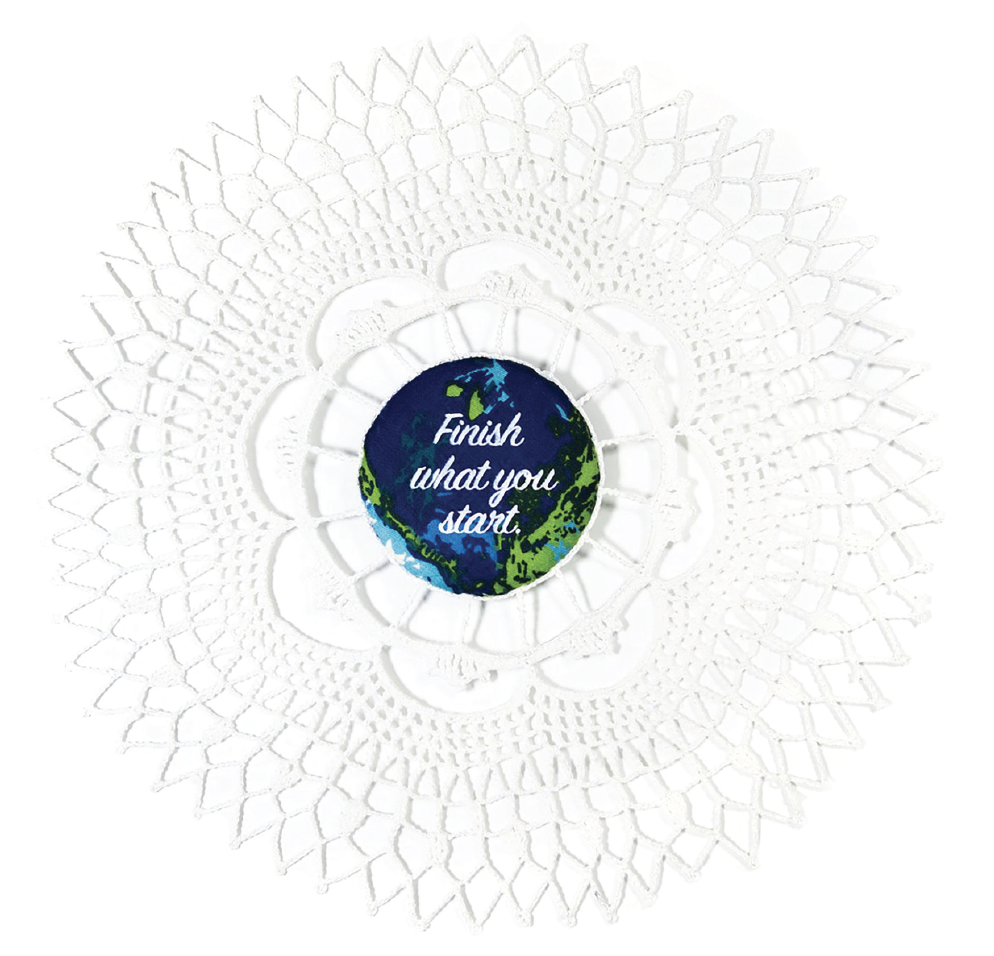Su Legatt:
Finish What You Start (Advice From Minnesota Grandmothers Series), 2016screen print on fabric, crocheted border, stretched over wooden disc
courtesy of the artist
resources:
artist site Bad at Sports podcast interview with Su Legatt and Donna Neuwirth Documentary on DISH, Lake Region Arts Council

The last decade has seen a profound expansion in socially-engaged practice across the arts landscape, as what began as a largely urban investigation of relational aesthetics’ connections to social and cultural contexts found support in publications, philanthropy, and universities. The work of artists such as Su Legatt reveals the lengths to which communities in rural America and Indian Country have naturally possessed – as a means of survival and cultural continuance – the strategies of exchange, dialogue, and collaboration that are recognized as hallmarks of socially-engaged art.
Acts of neighborliness, and an honoring of cultural heritage, animate the various mediums in which Su Legatt works. Based in Fargo-Moorhead, Legatt’s vision foregrounds lived, multigenerational knowledge; part of her awareness to these values is manifest in the longer-term nature of her projects, which stands in distinction to a kind of helicoptering into rural communities for one-dimensional exchange that has become more common in recent years. That more extractive form of engagement often misses the multigenerational knowledge that is a foundation of cultural life. In Advice from Minnesota Grandmothers, Legatt presents the inherited wisdom and wit from her home region on fabric she gathered during a local clean up week, rounded by a crocheted doily. Through crowdsourcing this advice on the internet, and merging those findings with a traditional art form found in so many homes across the Midwest, Legatt subtly underscores how the transmission of knowledge and local history continues, albeit in changed forms, in our digital culture.
These parallel streams converge as well in DISH, an “event-based creative research project” that foregrounds the potluck dinner as a platform for understanding a community’s richly diverse ancestral and family traditions. “Potlucks are a simple custom that seem to transcend political affiliations, economic status, religious orientation, and all other social demographics,” Legatt writes. Alongside the social exchange of a shared meal, Legatt pairs the recipe cards for each contributed dish with photographic documentation that illuminates these culinary traditions. “The photographs, taken at the beginning of each meal” Legatt writes, “serve as a form of portraiture, connecting the dish back to its creator, forming a collection to honor the individual efforts gathered for a community experience.”
These connections extend themselves into a recent and ongoing project that seeks to understand our senses of community in the midst of the challenges of COVID-19. In Look But Don’t Touch, Legatt directly addresses the linked states of isolation and perseverance found in the shutdowns and social distancing brought on by the pandemic. Through Polaroid portraits of families standing behind the doors and front windows of their houses, Legatt’s series recalls the earliest forms of rural community photography in pre-war real-photo postcards, while also offering a counterpoint to reductive representations of contemporary rural life. This project, as with much of Legatt’s work, stands as both an intimate community dispatch and a provocative merging of traditional and contemporary lenses through which to understand the dimensions of place.
︎︎︎return to exhibition artists
︎︎︎further information at Plains Art Museum